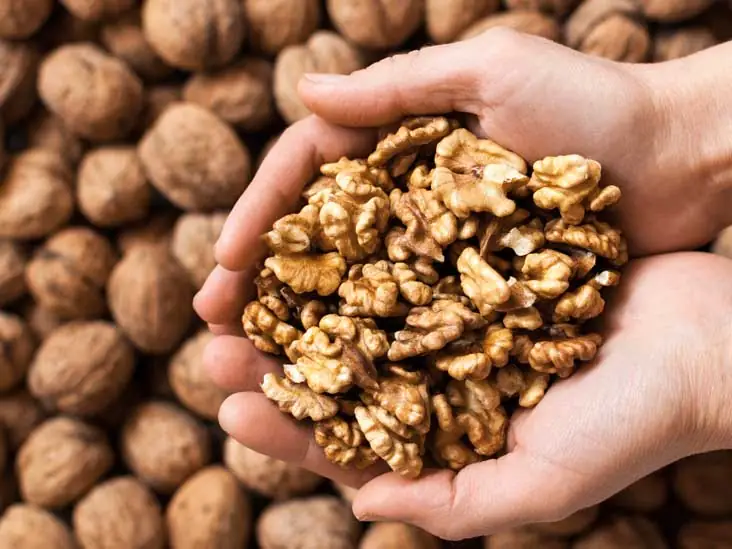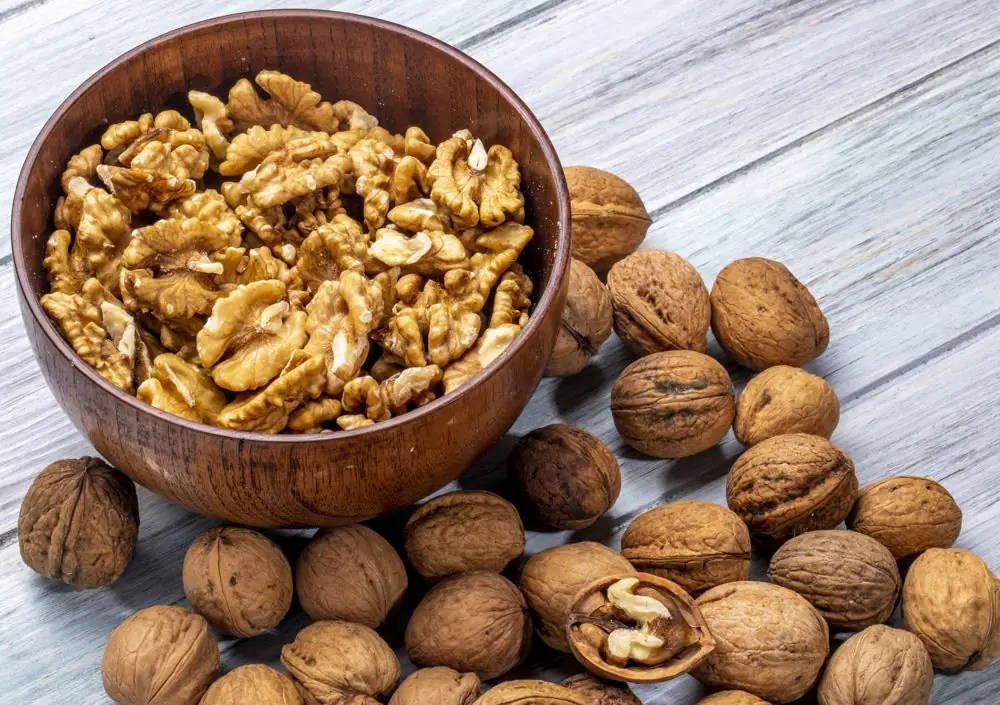Walnuts: Benefits for the Health That Are Worth Knowing

Tangy and pleasantly sharp, these nuts are impossible not to like. Why is it always a good idea to enjoy a handful of walnuts? What benefits for the health do they have? Are walnuts good for brain health?
Read on and you will find the answers to all these and numerous other questions.
What Are the Benefits of Walnuts for Health: Nutrition
Generally speaking, these nuts are very rich in vitamins and dietary minerals, and the only drawback to them is their high fat (especially ω-6 fatty acids) content.
Vitamins
These nuts contain copious quantities of B vitamins:
- B1 (30% Daily Value per 100 grams) — involved in numerous inter-cellular biochemical reactions
- B2 (13% DV) — required for cellular respiration and essential for antibody production
- B3 (8% DV) — used for DNA repair
- B5 (11% DV) — essential for breaking down fats, carbohydrates, and amino acids
- B6 (41% DV) — acts as a cofactor in the biosynthesis of neurotransmitters
- B9 or folate (25% DV) — required for DNA and RNA synthesis. It is essential that pregnant women get sufficient amounts of folate to ensure the proper development of the fetus.
What’s more, these nuts also feature very small amounts of vitamins C, E, and K. If you want to enrich your diet with vitamin E, almonds will be an excellent choice, and numerous vegetables (among them broccoli) are very good sources of vitamins C and K.

Dietary Minerals
Among the more important benefits of walnuts for health is their very high dietary mineral content:
- manganese (163% DV) — required for bone formation and protection of cells from free radicals
- phosphorus (49% DV) — needed for all cellular membranes, as well as for strong bones and teeth
- magnesium (45% DV) — required for the metabolism of ATP, the main source of energy for the cells
- zinc (33% DV) —used by numerous enzymes and required for the health of the reproductive system (especially in men)
- iron (22% DV) — required for hemoglobin, a biochemical compound that transports oxygen from the lungs to individual cells
- calcium (10% DV) — required for the proper function of neurotransmitters and bone strength.
Dietary Fiber
These nuts are also very rich in dietary fiber (6.7 g per 100 grams) that offers three important benefits:
- it cannot be digested by the stomach and helps you feel full while not providing calories. If you are on a diet and want to shed pounds, dietary fiber can be of great help;
- in combination with water it helps the stool get heavier and bulkier which is essential for the prevention of constipation;
- it is a portion of food for beneficial bacteria that live in the intestine. Vegetables and nuts that are rich in dietary fiber are one of the better ways to take care of your gut health.
Fat and Energy Content
The only drawback of these nuts is their extremely high-fat content (about two-thirds of their mass is fat). As a result, walnuts are a high-calorie food that, despite being rich in dietary fiber, is more likely to help you gain weight rather than lose it. It is, therefore, recommended that you enjoy only a small amount of them daily.
What’s more, these nuts are also very rich in omega-6 (also written as ω-6) fatty acids (38 g per 100 grams). There is a widespread theory that the excess of ω-6 and the lack ω-3 fatty acids in the diet can contribute to the development of a large number of chronic health issues, including rheumatoid arthritis, atherosclerosis, and cardiovascular disease.

On the bright side, there are recent studies that refute the theory that ω-6 fatty acids increase the risk of cardiovascular disease. As walnuts also contain very high quantities of ω-3 fatty acid called alpha-linolenic acid (9 g per 100 grams), they are very close to the recommended 4:1 ratio between ω-6 to ω-3 fatty acids. And, if you regularly consume fish oil that is extremely rich in ω-3 acids, you can eat walnuts without worrying about their high ω-6 content.
FAQ
In this section you will find the answers to the most common questions about walnuts.
Are Walnuts Good for Men’s Health?
These nuts are a very good source of zinc — a mineral that is present in semen in copious quantities. It is also believed that the growth of male reproductive organs and the normal function of the prostate require sufficient zinc intake. What’s more, as these nuts are also rich in B vitamins, they promote general wellness, which is essential for a healthy libido.
That said, there are other minerals, vitamins, and bioactive compounds that are known to have numerous benefits for men’s health. This popular dietary supplement combines almost all of them:

- 180 softgels — enough for 60 days of use
- Contains zinc — 136% DV
- Additionally contains selenium, vitamin D3, quercetin, nettle root extract, pumpkin seed oil, saw palmetto, lycopene, and β-sitosterol
- Well-known reliable brand
What Should I Choose: Walnuts vs Pecans
Health benefits of both these nuts are mutually supportive: while pecan is slightly richer in vitamin B1, manganese, and zinc, walnut leads when it comes to vitamin B6, folate, magnesium and phosphorus. On the other hand, pecan is richer in dietary fiber and poorer in omega-6 fatty acids. All in all, it is recommended that you combine moderate quantities of both these nuts in your diet to get all the vitamins and dietary minerals you need. Such delicacies as macadamia nuts, cashews, hazelnuts and almonds should not also be forgotten.
Which Walnuts Are the Healthiest: Black vs. English Walnut
While regular (‘English’) walnuts are much easier to buy, you might still want to put effort into getting some American black walnuts. While botanically speaking both these varieties are close relatives, black nuts are noticeably richer in vitamin B5 and vitamin E, as well as such dietary minerals as magnesium, manganese, copper, selenium, and phosphorus. What’s more, the black variety contains slightly fewer ω-6 fats.
Nonetheless, the regular variety offers greater quantities of vitamins B1 and B9 (folate), so once again, it is recommended that you use both varieties together to get the most out of each of them.
Is Eating Soaked Walnuts Good for Health?
Many people soak walnuts to improve their texture and make them easier to chew. What’s more, it is believed that soaking can increase the bioavailability of vitamins and dietary minerals, so you will get more health benefits from the same quantity of nuts. All you need to do is place your walnut pieces overnight in a cup of water and enjoy them in the morning.
Are Walnuts Good for Gut Health?
As these nuts are rich in dietary fiber that both feeds beneficial bacteria in your intestine and prevents constipation, they are a very good choice for taking care of your gut health. That said, almonds contain two times as much dietary fiber as walnuts, so if you want to help your intestine as much as possible, almonds should not be neglected.
Is Eating Walnuts Good for Your Brain Health?
There are numerous studies that demonstrate that eating these nuts (as well as other nuts and root vegetables) is associated with a smaller decline in cognitive function in older adults. In a 2012 study it was found that walnut, as a part of the Mediterranean diet, can improve working memory. Although additional research is required, there is a high probability that the inclusion of walnuts in your diet can help you slightly improve your brain function.

Are Walnuts Good for Heart Health?
As these nuts are rich in alpha-linolenic acid which is a precursor to other omega-3 fatty acids, it is believed to offer the highest benefits for heart health compared to other nuts. In fact, there are many studies that demonstrate that walnut consumption can lower levels of LDL (or “bad”) cholesterol, reduce inflammation, and improve blood vessel function.
What Are the Health Benefits of Eating Walnuts daily?
These delicious nuts help you get a significant quantity of B vitamins (especially B1, B2, B5, B9 (folate), and B6), as well as such dietary minerals as manganese, magnesium, phosphorus, zinc, and iron. These nuts are also likely to protect your heart and mental health and help you enjoy regular bowel movements.
The only drawbacks of walnut are that it is also rich in fat and potentially unsafe omega-6 fatty acids. So, if you eat walnuts every day and want to minimize the effects of the excessive quantities of ω-6, you might want to add such ω-3 and ω-9 rich foods as fish oil and olive oil to your diet.
Here is one of the highest-rated fish oils on iHerb:

- Enough for four months of use
- Ultra-high DHA and EPA content
- Very low in cholesterol
- Lemon-flavored
- No artificial colors and flavors
And here is one of the most popular olive oils in this online store:
Extra Virgin Olive Oil by Gaea

- 500 ml (16.9 fl oz)
- Cold-extracted
- 83 grams of ω-9 per 100 grams
Now you know what vitamins and dietary minerals can be found in walnuts. Benefits for the health of these nuts far outweigh the sole disadvantage of the high omega-6 fatty acid content. If you want to get as many essential nutrients as possible, combine walnuts in your diet with all other kinds of nuts like macadamia, cashew, almond, hazelnut, and pecan.